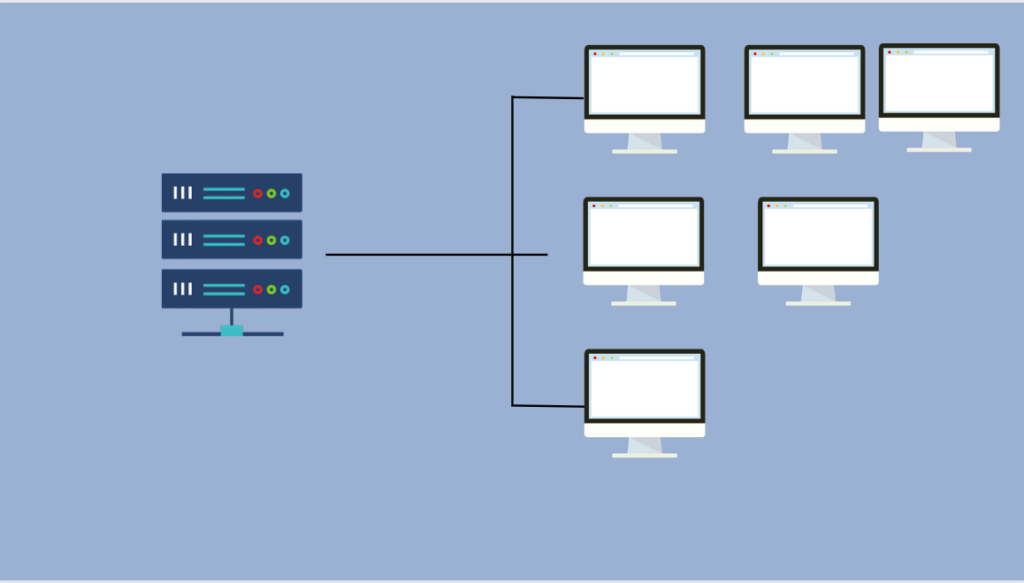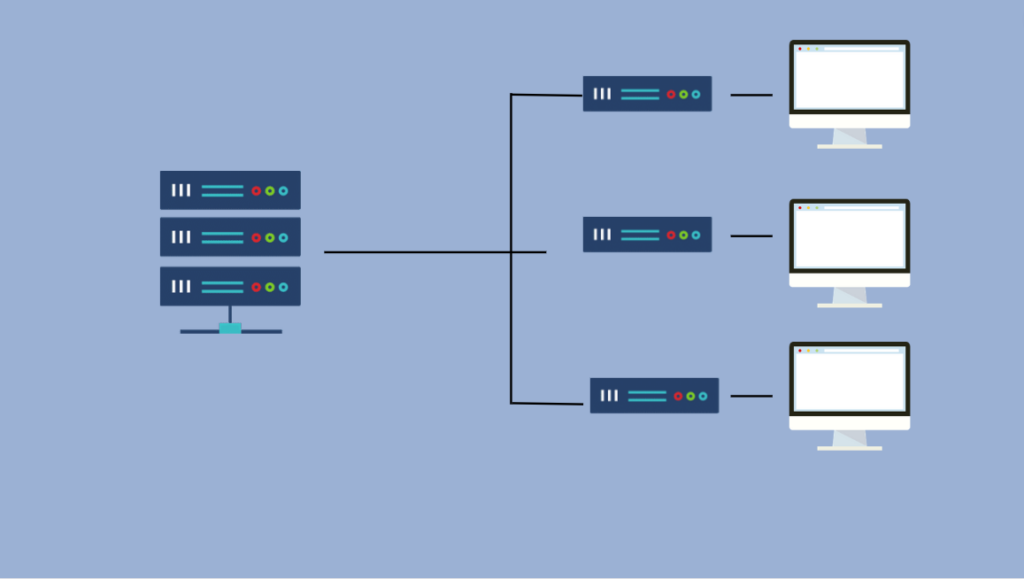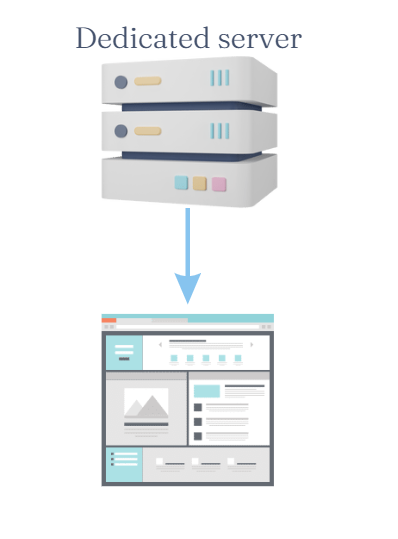- What is dedicated web hosting?
- Dedicated vs VPS vs shared hosting
- Benefits of dedicated servers
- Limitations of dedicated hosting
- Hosting providers compared
- Sons of the Forest- dedicated gaming server
- Tips for choosing a web hosting service
- Conclusion
What is a dedicated server? If you’re a website owner, chances are you started with shared hosting for its affordability.
But as your online presence grows, it’s important to explore more robust options. That’s where dedicated servers come in.
In this comprehensive guide, we’ll answer the question: what is a dedicated server? Let’s delve into the world of dedicated servers, comparing them to other hosting types and helping you determine if they’re the right solution for your needs.
Get ready to unlock the power of a dedicated server and take your website to new heights!
What is a dedicated server?
A dedicated server is a powerful and exclusive web hosting solution designed to meet the specific needs of a single user or organization.

Unlike shared hosting, where multiple websites share resources on a single server, a dedicated server provides an entire physical server dedicated solely to one user. This means you have complete control over the server’s resources, including processing power, memory, storage, and bandwidth.
With a dedicated server, you have the flexibility to customize the server environment according to your needs. You can install specific software, configure settings, and optimize the server to cater to your unique applications, databases, and websites.
As websites begin their journey, many opt for the affordability of a shared hosting plan. However, as they flourish and outgrow the limitations of these budget-friendly options, it becomes necessary to consider more advanced alternatives.
Two potential paths lie before you: upgrading to a virtual private server (VPS) or stepping into the realm of dedicated servers. The choice ultimately rests in your hands as you carefully examine the various options and determine the best fit for your evolving needs.
Comparing dedicated servers to other hosting types
When it comes to hosting options, understanding the differences between various types is essential in selecting the right solution for your website.

Shared hosting, a popular choice for personal blogs and small businesses, involves sharing a server with numerous other websites. While it can suffice for modest needs, its performance and customizability are limited due to resource sharing with other users.
See our comprehensive guide to learn more about shared hosting servers.
Virtual Private Servers (VPS) offer a dedicated space for your website while still sharing a virtual server with others. This segregation ensures more consistent performance, and there is greater flexibility in configuring the server settings to suit your needs.

VPS plans strike a balance between cost and speed, providing the necessary performance at a lower price point, making them a favorable choice for those seeking an upgrade from shared hosting.
If you require maximum power and control over your hosting environment, dedicated server hosting is the ultimate choice. With a dedicated server, you have exclusive access to an entire server, ensuring exceptional performance and extensive customization options.
It’s worth noting that dedicated hosting can be more expensive, with some plans reaching three-figure monthly prices. However, as your website grows and requires additional resources to handle increased traffic, the investment in a dedicated server becomes increasingly valuable.
Check out our article for more information about different hosting types and their costs.
4 Benefits of dedicated hosting

When it comes to server plans, dedicated hosting stands out as one of the most powerful options available, rivaling cloud hosting.
But you may wonder if it’s necessary for your website. Let’s explore four compelling reasons that may convince you to open your wallet for dedicated hosting.
1.) Handling increased traffic
If your website is on the path of rapid growth, it’s wise to consider a dedicated server. Shared hosting can struggle to cope with sudden spikes in traffic, resulting in significant performance drops.
This can lead to higher bounce rates and potential revenue loss. By migrating to a dedicated server ahead of time, you give yourself the opportunity to optimize your site’s performance and ensure a seamless user experience.
Your website should be prepared to handle traffic surges of up to 30 times your usual daily volume, accounting for promotions, and special events. Failing to prepare adequately can result in crashes or a poor user experience.
2.) Enhanced security
Security is a paramount concern, particularly for websites dealing with sensitive information like confidential emails, credit card details, or customer data. With a dedicated server, you have full control over your site’s security measures.
This empowers you to optimize the features and protocols to meet your specific requirements. While this responsibility means you need to implement security measures effectively, the flexibility it provides is one of the key benefits.
Some hosting providers offer fully-managed or semi-managed maintenance plans. These options allow you to specify the areas you and your host will handle, allowing you to entrust critical functionalities to experts while managing other aspects directly.
3.) Optimal page loading times
Page loading speed significantly impacts various aspects of your website. Slow loading times can result in low engagement and high bounce rates. A dedicated server plays a crucial role in optimizing this critical aspect.
On a shared server, you lack visibility into resource usage by other sites, which can slow down your own. By choosing a dedicated server, you ensure that you have ample bandwidth to improve your page loading times.
4.) Complete control
The final reason to opt for a dedicated server is simple: control. Dedicated hosting grants you complete authority over how you utilize your server resources.
For instance, you have the freedom to select your preferred server software, such as NGINX or Apache, based on your resource control preferences.
You can also adjust hardware specifications and install your desired operating system (OS). This level of control makes dedicated hosting an appealing choice for advanced web developers and those with unique requirements.
Shortcomings of dedicated hosting
Cost
Dedicated server hosting tends to be more expensive compared to shared hosting or virtual private servers (VPS). The higher cost is primarily due to the exclusive use of server resources, maintenance, and advanced features.
Technical Expertise
Managing a dedicated server requires technical knowledge or the assistance of a server administrator. You need to handle server setup, software updates, security configurations, and troubleshooting issues. This level of control may not be suitable for those without technical expertise.
Maintenance Responsibility
With dedicated servers, you are responsible for server maintenance and ensuring its optimal performance. This includes regular backups, security measures, software updates, and monitoring to address any potential issues promptly.
Limited Scalability
While dedicated servers offer substantial resources, there can be limitations to scalability. If your website experiences sudden surges in traffic, you might need to upgrade to a higher-tier dedicated server or consider other solutions.
Resource Allocation
With a dedicated server, you have complete control over resource allocation. However, mismanagement or improper distribution of resources can result in inefficiencies or underutilization. It requires careful planning and monitoring to optimize resource allocation effectively.
Where can you find dedicated server hosting?
Numerous well-known hosting companies provide a range of hosting plans to accommodate various needs and budgets. This means that you can often find both an affordable shared hosting service and robust dedicated servers offered by the same company.
Our recommended options and their monthly fee:
- Bluehost – Starting at $79.99 per month
- A2 Hosting – Starting at $99.59 per month
- SiteGround – Starting at $100.00 per month
Compare the 3 dedicated hosting providers
| Hosting Provider | Dedicated Hosting Starting Price | Rating |
|---|---|---|
| Bluehost | $79.99 per month | 4.5 based on 5,000+ reviews |
| A2 Hosting | $99.59 per month | 4.3 based on 3,000+ reviews |
| SiteGround | $100.00 per month | 4.7 based on 4,000+ reviews |
Every hosting company above offers dedicated hosting solutions that cater to different requirements, allowing you to choose the one that best suits your website’s needs and budget.
Dedicated gaming server- Sons of the Forest
Want to level up your Sons of the Forest gaming experience? Consider hosting a dedicated gaming server! It gives you more control, stability, and cool customization options compared to regular connections or game developer servers.

With your own dedicated server, you’ll enjoy smoother gameplay because it reduces lag and annoying disruptions caused by crowded networks. It’s like having your own private gaming world just for you and your friends.
The best part? You can personalize your gaming experience! Adjust settings, create unique game modes, and even add mods to make the game more exciting and tailored to your liking. It’s all about having fun and unleashing your creativity!
Another awesome thing about a dedicated gaming server is that it keeps your gaming environment safe. You won’t have to worry about cheaters or troublemakers ruining the fun. You get to play with trustworthy friends in a secure and enjoyable space.
When choosing a web host for your dedicated server, make sure they’re reliable, have good hardware, and offer great server management in their hosting service. Look for companies that know their stuff when it comes to gaming servers and have positive reviews from other gamers.
Sure, hosting a dedicated server may cost a bit more, but the benefits are totally worth it! Say goodbye to lag, enjoy customized gameplay, and build a tight-knit gaming community with your friends.
So, if you’re ready to take your Sons of the Forest adventures to the next level, give a dedicated gaming server a try. It’s like having your own secret gaming hideout where the fun never ends!
6 Tips for choosing a web host
1.) Assess your website’s needs
Consider the specific requirements of your website, such as expected traffic, storage needs, and any special features or technologies you may require. Understanding your needs will help you find a hosting provider that can meet them effectively.
2.) Evaluate reliability and uptime
Look for a hosting provider that offers a reliable and stable hosting environment. Check their uptime guarantees, which indicate the percentage of time your website will be accessible to visitors. Aim for a provider with a high uptime guarantee, preferably 99% or above.
3.) Consider customer support
Good customer support is crucial in case you encounter any issues or need assistance. Look for a hosting provider that offers 24/7 customer support through multiple channels, such as live chat, phone, or email. Read reviews or testimonials to gauge their responsiveness and helpfulness.
4.) Review hosting features
Compare the features offered by different hosting providers. Look for essentials like sufficient storage space, bandwidth allocation, and the ability to handle your website’s traffic. Additionally, check for features such as easy-to-use control panels, one-click installation of popular applications, and SSL certificates for secure data transmission.
5.) Check pricing and scalability
Compare the pricing plans of different hosting providers and ensure they fit within your budget. Consider whether they offer scalable options, allowing you to upgrade your hosting plan as your website grows. Keep an eye out for any hidden costs or long-term commitments that may limit your flexibility.
6.) Read user reviews
Read reviews and feedback from other customers to get an idea of their experiences with the hosting provider. Look for reliable sources such as independent review websites or reputable online communities. This can provide insights into the provider’s reputation, reliability, and overall customer satisfaction.
Conclusion
If you’re facing challenges with your website’s performance due to increased traffic, it’s worth considering a migration to a dedicated server. A dedicated server exclusively hosts your site, offering improved performance, faster page loading times, and enhanced security measures.
To summarize, here are the key reasons to consider a dedicated server:
- Scalability: As your website grows, a dedicated server can handle the increased traffic effectively.
- Security: With dedicated web hosting, you have full control over your site’s security, ensuring the protection of sensitive information.
- Performance: Optimal page loading times are crucial for user engagement, and a dedicated server provides the necessary bandwidth for faster loading speeds.
- Control: Having complete control over your server allows you to customize server configurations to meet your specific needs.
By upgrading to the right dedicated server, you can address these concerns and enjoy a more robust and efficient hosting solution for your website.
